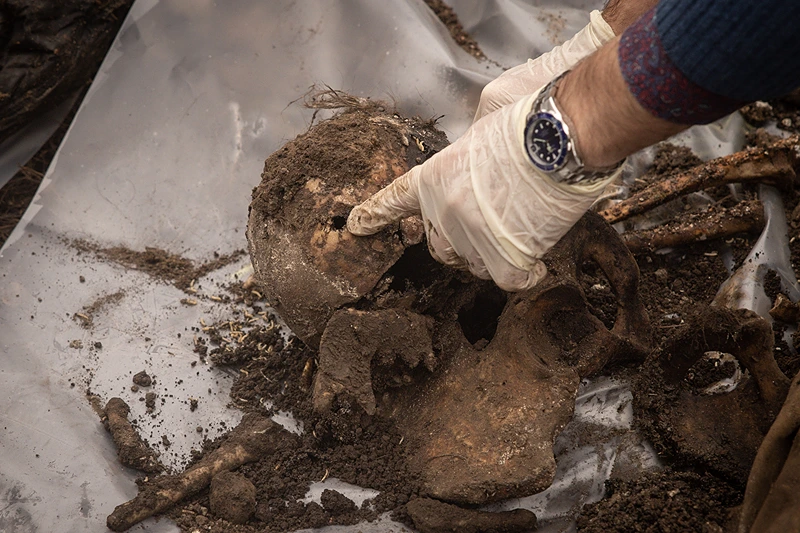

OAN’s Brooke Mallory
6:11 PM – Tuesday, June 13, 2023
Archaeologists have recently unearthed a horrific mass grave of 450 desecrated remains thought to belong to those accused of “vampirism.”
Advertisement
The mass burial was discovered by construction workers in Luzino, northeast Poland, and was packed with a plethora of skeletons, many of whom had been beheaded and placed in unusual configurations.
Additionally, a good portion were discovered with coins and bricks in their mouths and skulls placed between their legs, which were historic “cures” for vampirism practiced by Europeans in the nineteenth century.
Maciej Stromski, an archeologist who had overseen the massive dig, told the press that beliefs surrounding burial were very popular centuries ago.
“It was believed that if a member of the deceased’s family died shortly after the funeral, then he or she could be a vampire. Therefore, after burial, the grave was dug up and the deceased’s head was cut off, which was then placed in the legs,” Stromski said. “We also discovered an example of a woman after decapitation. The skull of a child was laid on her bosom.”
According to Matteo Borrini, principal lecturer of forensic anthropology at the Liverpool John Moore University, the “undertakers” did this because they believed that undead bodies were responsible for spreading illnesses like the bubonic plague.
He continued, explaining how they believed during that time that zombie bodies would tear through the dirt and spread terrible diseases “in a sort of black magical way” due to “demonic influence.”
Whether or not one believes in vampires, in the past many serial killers were labeled as such due to their sick, twisted methods of killing people and drinking or bathing in their blood.
Vlad III, known as Vlad The Impaler, was a Wallachian monarch in the 1400s and is still undoubtedly the most renowned “vampire” murderer. Vlad’s background is rife with political intrigue, espionage, and treachery. He was infamous for impaling his opponents’ armies and consuming his opponents’ blood. Anyone found to have plotted against him or his family was sentenced to death.
Elizabeth Báthory, a Hungarian female serial killer that was historically labeled a vampire, lived during the late 1500s and is thought to have held prisoner, tortured, and killed hundreds of women and young girls. She was suspected of being a vampire after allegations that she not only committed to cannibalism, but also bathed in the blood of her victims. Báthory’s standing as a noblewoman allowed her to get away with these crimes for a long time.
However, the fear of vampires is not only a relic of the past.
A senior politician in Malawi named Eric Chiwaya was nearly stoned to death in 2003 by an enraged mob of at least 100 people who were accusing him of hiding vampires at his house.
He luckily survived the ordeal, which saw protesters voice their suspicions that he was conspiring with vampires and the nation’s government to gather human blood for international aid agencies.
Stay informed! Receive breaking news blasts directly to your inbox for free. Subscribe here. https://www.oann.com/alerts





Be the first to comment